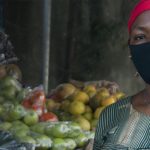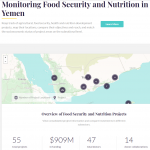IFPRI’s 2020 Annual Report presents highlights from our research work around the world. Cutting-edge research on the impacts of the COVID-19 pandemic and related policies, and on our strategic research areas—climate resilience and sustainability, healthy diets and nutrition, inclusive and [...]
IFPRI-USAID Egypt Virtual Symposium: 8 December, 2:00 – 4:00 PM (CLT)
© Mohammed Fouad 2018 The event presented key findings and policy recommendations based on research and capacity building activities conducted by IFPRI and its Egyptian partners under the USAID-funded Evaluating Impact and Building Capacity (EIBC) project. It informed Egypt’s post-COVID-19 development agenda, presented a digital monitoring tool (MAP Egypt), and identified directions for future policy […]
Emergency Assistance Requires Coordination: MAP YEMEN
Scaling Up Nutrition Yemen
Heidi Kandil, IFPRI Intern
The humanitarian crisis in Yemen remains the worst in the world. Nearly five years of conflict and severe economic decline are driving the country to the brink of famine and exacerbating needs in all sectors. The disruption of official markets, currency fluctuations, rising commodity prices and the diminished ability of the public to purchase basic food needs are some of the key issues that need to be addressed.
Map Yemen: A New Tool for Coordinated Reconstruction and Improving of Food and Nutrition Security in Yemen
Abdul Wahed Mukred, Ministry of Planing and International Cooperation, Yemen
Abdul Rahman Bamatraf, Hadramout University
A comprehensive interactive database on food and nutrition security projects and related Sustainable Development Goal Indicators has been lacking in Yemen for a long time. The Food Security Technical Secretariat (FSTS) and Scaling Up Nutrition Coordination Secretariat (SUN) with support from the Deutsche Gesellschaft fuer Internationale Zusammenarbeit (GIZ) and the International Food Policy Research Institute (IFPRI) have addressed this gap by building MAP Yemen. The introduction of MAP Yemen is considered a milestone towards more coordinated and evidence-based project and policy planning in Yemen.
Can Aquaculture Contribute to Food and Nutrition Security in the Middle East?
August 19, 2015 By: Stephen Hall, Director General - WorldFish Share URL Fish provides an affordable source of protein and essential nutrients for many poor people globally. As demand for fish grows, and now the limits to wild catches are being reached, it is aquaculture that must fill the gap. The World Bank’s report “Fish to 2030: […]




